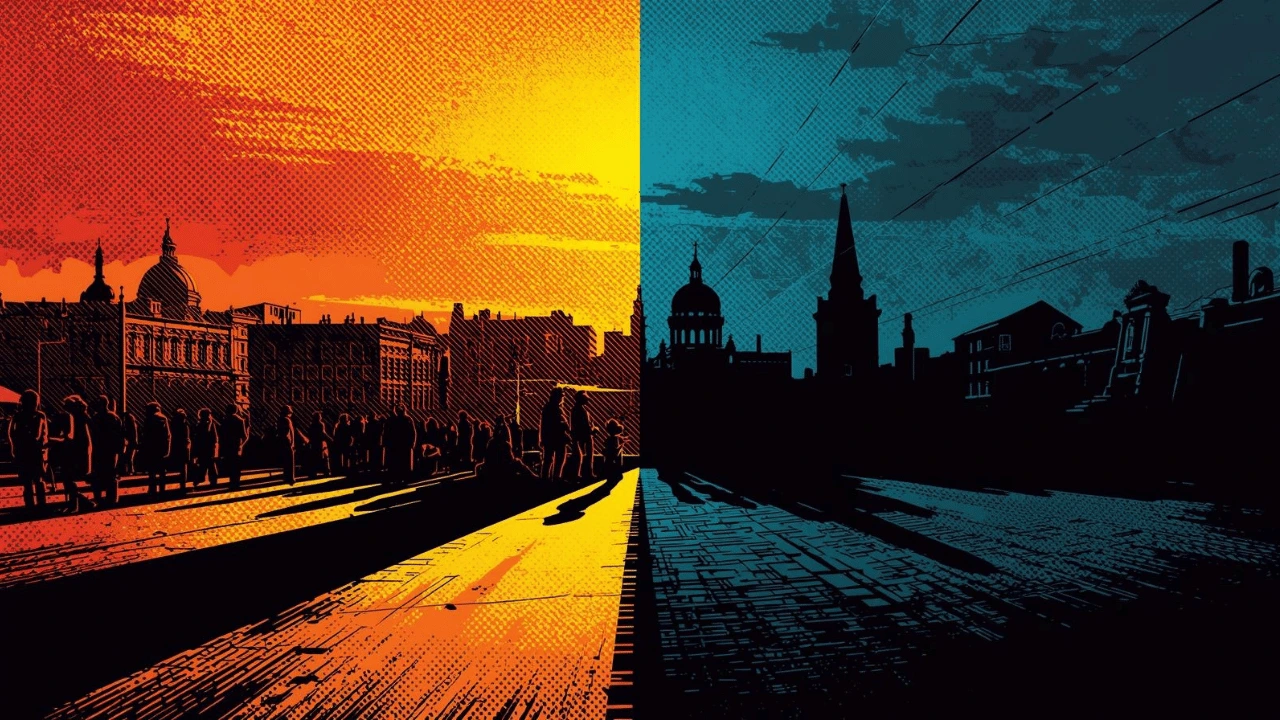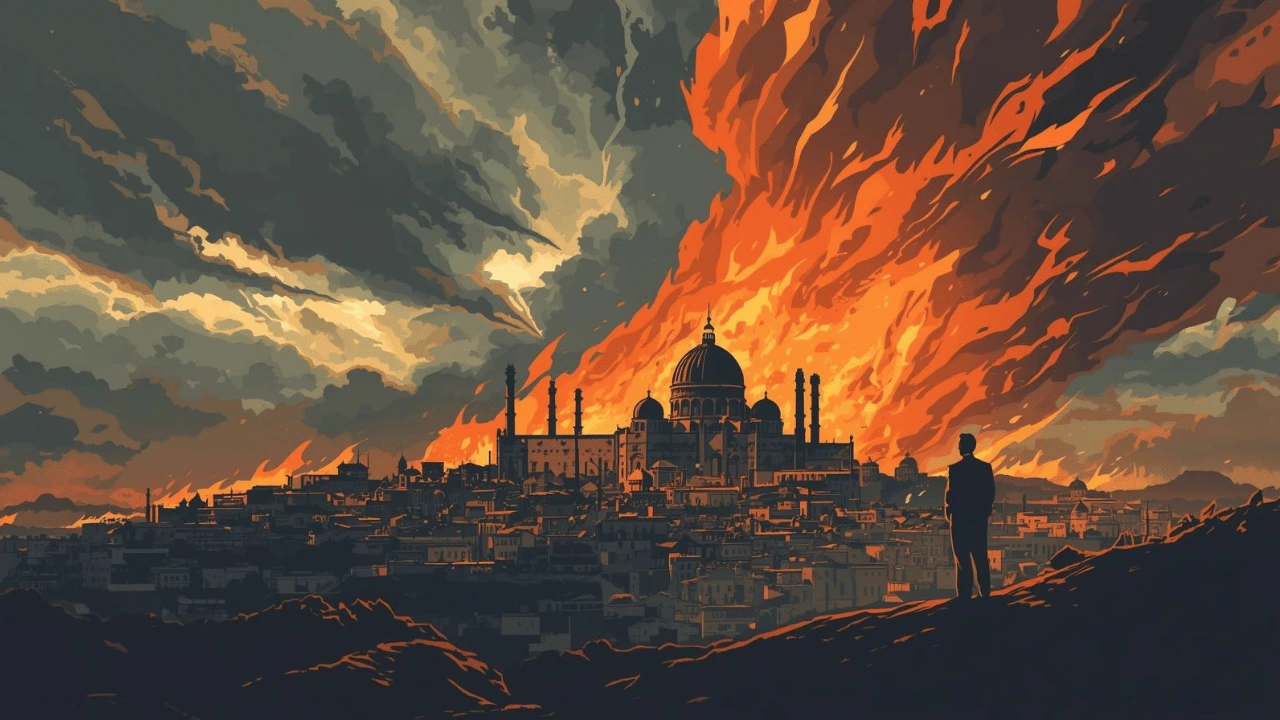The Biblical Background of Sodom and Gomorrah
Before drawing moral or spiritual insights, it’s important to revisit what truly happened in Sodom and Gomorrah. These weren’t merely ancient cities — they stand as one of Scripture’s most striking moral warnings, reminding us what unfolds when a society turns away from justice, kindness, and reverence for God.
The Story in Genesis – What Really Happened
The account of Sodom and Gomorrah appears mainly in Genesis 18–19. These neighbouring cities lay in the fertile Jordan plain, once described as “like the garden of the Lord” (Genesis 13:10). Yet beneath their prosperity ran deep corruption. God revealed to Abraham that “the outcry against Sodom and Gomorrah [was] great and their sin [was] very grievous.”
Abraham, moved with compassion, pleaded with God to spare the cities if even a handful of righteous people could be found. Despite his intercession, not even ten righteous souls were discovered. Two angels visited Sodom and were welcomed by Lot — Abraham’s nephew — whose hospitality stood in stark contrast to the townsmen’s depravity. Their violent actions confirmed the city’s moral decay, leading to its destruction by fire and brimstone.
The Sins of Sodom Explained Through Scripture
Sodom’s sins went far beyond a single act of wrongdoing. Scripture paints a broader picture of pride, injustice, and cruelty. Ezekiel 16:49–50 makes it clear:
“Now this was the sin of your sister Sodom: she and her daughters were arrogant, overfed, and unconcerned; they did not help the poor and needy.”
This passage reveals the core of Sodom’s downfall — arrogance, greed, and indifference to suffering — the very attitudes that can corrode any community from within.
Abraham’s Intercession and God’s Judgment
Abraham’s heartfelt plea reminds us that God’s judgment is never rash or unfeeling. His justice is deliberate, tempered by mercy. God was willing to spare the entire city for the sake of ten righteous people — a profound testimony to His compassion. When judgment finally came, it was not out of cruelty, but because Sodom had utterly rejected righteousness.
The Moral Decline of Sodom

Sodom’s destruction wasn’t sudden — it was the result of years of moral neglect. The city thrived materially but decayed spiritually, blinded by arrogance and apathy.
Arrogance, Injustice, and Moral Decay
When wealth, comfort, and pleasure become life’s main pursuits, humility and compassion often fade. Sodom’s prosperity led to pride, and pride to cruelty. Justice was ignored, and the weak were forgotten. This timeless pattern reminds us that moral decay doesn’t happen overnight — it begins with the slow erosion of conscience.
The Rejection of Compassion and Hospitality
Hospitality was sacred in the ancient world, yet the men of Sodom violated it through hostility and violence. Lot’s willingness to protect strangers contrasted sharply with the mob’s aggression. Their lack of basic decency signalled the city’s spiritual death. Where empathy disappears, corruption inevitably follows.
What the Prophets Said About Sodom’s Behaviour
Throughout Scripture, the prophets used Sodom as a moral warning. Isaiah likened Israel’s leaders to those of Sodom for their hypocrisy (Isaiah 1:10). Jeremiah compared false prophets to Sodom’s citizens for leading people astray (Jeremiah 23:14). Ezekiel revealed that pride, indulgence, and indifference to suffering were Sodom’s defining sins — signs of a society losing its soul.
God’s Justice and Mercy in the Story of Sodom
At first glance, Sodom’s destruction may appear to be only judgment — but woven through the narrative is a clear thread of mercy.
How Divine Justice Was Balanced with Mercy
God did not act without warning. He revealed His plan to Abraham, allowing time for intercession. He sent angels to rescue Lot and his family, providing a way out before judgment came. This balance shows that God’s justice is always preceded by patience and opportunity for repentance.
The Significance of Lot’s Rescue
Lot’s deliverance represents divine protection for those who strive to remain faithful amid corruption. Though hesitant, his willingness to leave reflected faith — a choice to turn away from destruction. When his wife looked back, the message became clear: clinging to a doomed way of life prevents true deliverance.
What God’s Response Teaches About Accountability
Sodom’s downfall teaches that societies are held accountable for their moral choices. God’s justice is not arbitrary — it is the inevitable result of persistent rejection of truth and goodness. The story underscores that accountability is both individual and collective.
Lessons for Modern Society from Sodom’s Example
Sodom’s story remains strikingly relevant because human nature has not changed. The same forces that corrupted it — pride, greed, and apathy — still threaten us today.
The Danger of Moral Complacency
Comfort can breed carelessness. Sodom’s citizens enjoyed abundance but ignored virtue. Today, we see similar patterns when success and self-interest overshadow integrity. Moral complacency eventually leads to spiritual collapse.
The Importance of Compassion and Righteousness
Perhaps the greatest lesson from Sodom is the value of compassion. Prosperity without generosity leads to decay. True righteousness means living with justice, mercy, and humility. As Micah 6:8 beautifully states:
“What does the Lord require of you but to act justly, love mercy, and walk humbly with your God?”
How Societies Can Avoid Repeating Sodom’s Mistakes
A society preserves its strength by upholding humility, justice, and compassion. When people care for the vulnerable and live with integrity, they build a moral foundation that endures. Sodom’s fall is not merely a tale of destruction but a reminder and a call — to rebuild through righteousness.
Personal Lessons for Spiritual Growth

Sodom’s story also speaks to individuals. Before cultures fall, hearts grow cold. Spiritual decline begins privately, long before it becomes public.
Examining One’s Own Heart and Values
Each of us must ask: Am I choosing comfort over conscience? The story of Sodom calls for honest reflection — to nurture empathy, uphold justice, and live with integrity even when it’s difficult.
The Call to Integrity and Repentance
Lot’s rescue shows that repentance and faith open the door to mercy. Integrity means standing for what’s right, even when surrounded by wrong. Repentance is not just regret — it’s the choice to change direction.
How Faith and Humility Protect Against Corruption
Faith grounds us when the world wavers, and humility keeps us compassionate and teachable. Together, they shield us from the pride and hardness that destroyed Sodom. In uncertain times, humility and faith remain our surest protection.
Sodom’s Legacy in Religious and Cultural Thought
Across centuries, Sodom has remained a symbol — a story that bridges faith traditions and continues to challenge the human conscience.
How Sodom Is Remembered Across Faiths
In Judaism, Sodom represents a society stripped of charity and compassion. In Christianity, it stands as a warning against rejecting God’s ways and a call to repentance, as echoed in Luke 17:29–32. In Islam, the people of Prophet Lut (Lot) are remembered as a community punished for transgression, highlighting divine justice and accountability. Across these faiths, Sodom’s story speaks to a universal truth — that righteousness sustains societies.
Symbolism of Sodom in Modern Moral Discourse
Today, Sodom symbolizes the perils of moral blindness — a warning against excess, injustice, and indifference. In literature, art, and culture, it continues to mirror the struggles of societies that prioritize wealth over compassion.
Why the Story Still Matters
Even in an age of progress, Sodom’s lesson remains relevant: prosperity without principle invites peril. It reminds us to live with integrity, practice mercy, and recognize that moral strength is the true foundation of peace.
Frequently Asked Questions
What was the main sin of Sodom according to the Bible?
Scripture identifies pride, selfishness, and a lack of compassion as Sodom’s primary sins (Ezekiel 16:49). These deeper moral failings led to widespread injustice.
Why did God destroy Sodom and Gomorrah?
Because the cities had reached a point of total moral collapse — where evil was celebrated, and goodness rejected. Judgment came only after persistent refusal to repent.
What can modern cities learn from the fall of Sodom?
That wealth and comfort must be guided by compassion and integrity. A society that neglects justice and mercy eventually destroys itself from within.
How does the story of Sodom apply to personal life today?
It challenges each of us to resist pride, embrace humility, and show kindness. The story becomes a mirror for our own choices.
What message of hope can be found in Lot’s story?
Even in judgment, there is mercy. Lot’s rescue proves that faith and obedience can lead to deliverance, no matter how dark the world becomes.
Sodom’s Warning and Wisdom
Sodom’s story is more than a tale of destruction — it’s a message about choices. Every generation faces its own test: will we choose arrogance or humility, selfishness or compassion, corruption or righteousness? The lessons of Sodom echo through time as both a warning and a call to renewal.
When we live with justice, mercy, and faith, we not only avoid Sodom’s fate — we build a world where goodness can truly thrive.

